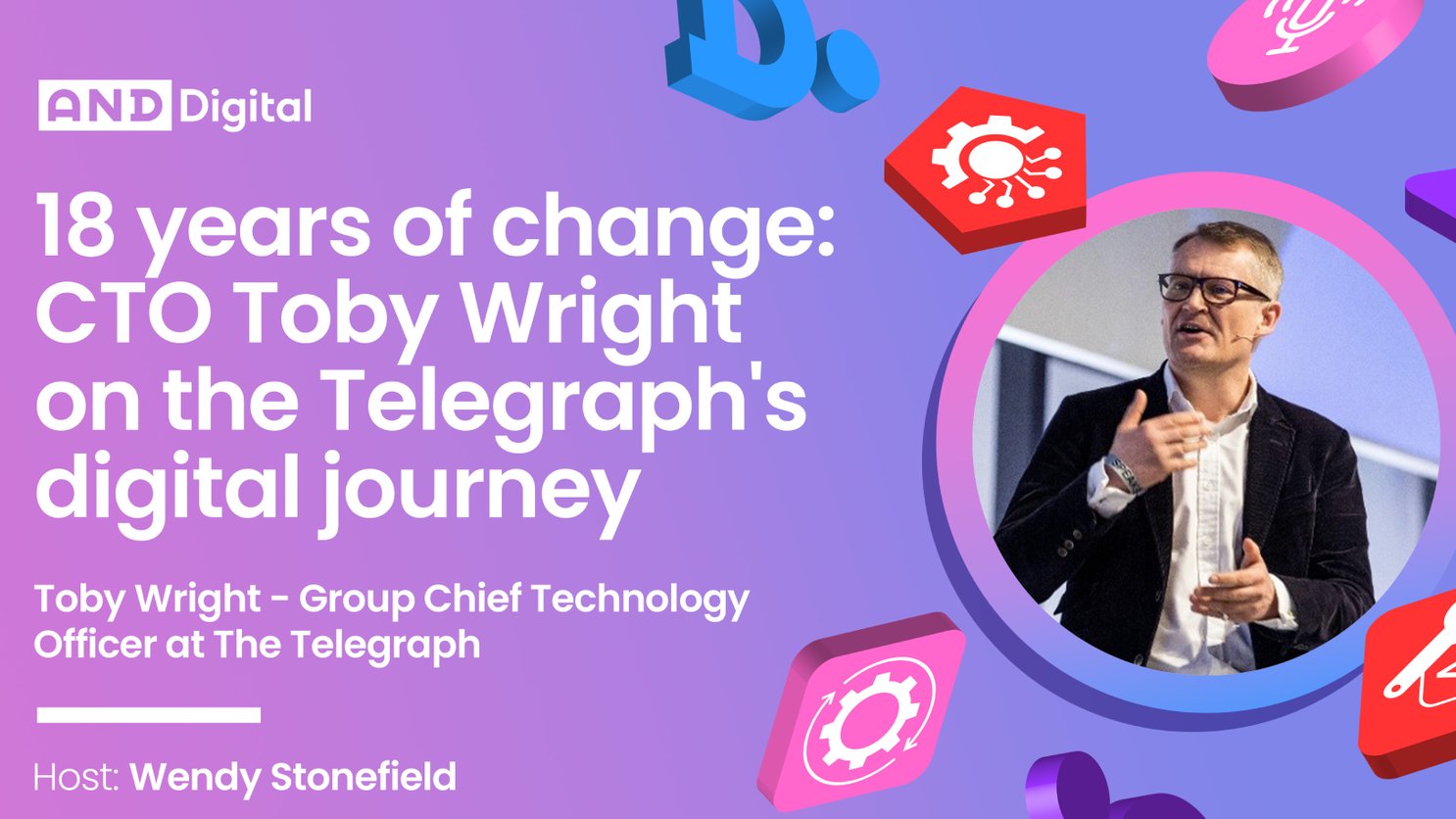Tech Leadership
In conversation with: Toby Wright, Group CTO at Telegraph Media Group
04 June 2025 • 5 min read

Toby Wright's journey to Group Chief Technology Officer at Telegraph Media Group wasn't typical. School wasn't particularly successful; he was interested in computers, but his school only had one of them ("you had to sort of fight for it"). So his 'in' was six months of unpaid night shift work for Intel in Swindon, learning as he went.
In the most recent edition of Being a digital leader: The good, the bad and ugly of digital transformation, Toby sat down with AND Digital's Wendy Stonefield to discuss the journey from Intel to celebrating 18 years with Telegraph Media Group. Here are seven key takeaways from the discussion, starting with the baddest and ugliest of them all...
1. The need to balance ambition and well-being
In 2015, Toby was in the office early one morning when he suffered heart failure. He wasn’t back at his desk for seven months. Wendy and Toby discussed the personal stress and challenge of navigating transformation as a leader, and of the need to step back from overthinking and overcommitting.
“It gave me some perspective, but I don't recommend it,” he said. “When your children know the names of all of your staff because they're always ringing you in the middle of the night… that's a really bad thing. That should have been a signal. I realised you can have a perfectly satisfactory career without doing things like that.”
2. The power of an immovable deadline
July 2000 was a landmark in UK TV history. That was when Big Brother first aired, and Toby was at the centre of an Intel project to build the data centre that would handle the UK’s first major live streamed show.
“No one had done any of that at that scale,” he said. “We had one year from launch to broadcast and the broadcast date wasn’t going to move. Most people take four years to do this sort of thing, and we did it in a year. It was just the most phenomenal achievement I've ever been part of.”
3. The importance of protecting brand heritage
A newspaper is a fantastic asset, and the Telegraph is a significant brand. Toby reflected on the care with which the Telegraph incorporates advertising and commercial into its content. “It has to be all about the reader,” he says. “We're not trying to compromise the experience with commercial offers and advertising. It's about keeping it subtle and in-keeping with the essence of the brand.”
4. Constant transformation, not one-off change
“I think we will forever be in a state of transformation,” Toby explains. “You don't do something, stop and then do it again in six months. It's a continuous effort to do something better today than we did yesterday, to do it faster, cheaper, safer, better for the consumer, better for the product, better for our internal audience, better for the journalist.”
As he noted, the news media has a long history of adjusting to and harnessing the latest technology. Today, the challenge is AI, because “when an AI overview answers a question, you don't get the click back. So we have to look at different ways of dealing with this. We have to look after our subscribers because the acquisition channels are getting smaller. It’s understanding how you maximise lifetime value, your retention strategy, and how you encourage people to spend time with your products.”
5. Will it work when the Queen dies?
The passing of a monarch is a moment of immense national significance. Within the news media, however, the Queen’s death was also something to be meticulously planned for, and a mantra for the success of any tech upgrade.
“I remember someone telling me when I joined in 2008 that the use case for whenever we did technology builds was: will this work when the Queen dies?”
When the moment arrived, Telegraph Media Group had just finished an 18-month rollout of its new website and publishing system.
“We were running the old and new systems side-by-side, which was a massively complicated technical undertaking, but we had to do it because we needed to see the two together and know that the new system was capable of handling up to 12 million page views a day with millions of individual users,” said Toby. “That was one of the biggest traffic events we'd ever experienced. But it worked, and it worked again for the coronation. I was super proud about that because it would have been so easy to kick the project down the road for a year and do it later.”
6. The value of tenure
We’re not sure what the average tenure of a CTO is, but longevity brings advantages. “It is part of my thought process,” Toby confessed. “Whatever decision I make today, I’ll probably be here when it gets done and breaks in a year or two. So I'm probably gonna have to do it properly. It does drive a very different sort of decision making.”
7. The impact of AI on journalism
The Telegraph has been using “old fashioned” (as Toby puts it) AI for seven or eight years to segment and categorise audiences and subscriptions. But how have things changed?
“Now generative AI has come after the creative industries, but I think we've got a very strong stance, which most of our peers have. We won't use generative AI to create content, because how do we then differentiate ourselves from somebody like a big technology platform who can do that?
“We use AI for pre-production and reduction. We’re using it to make sure that every single article has got the right accessibility or SEO tags. We’re using it to surface relevant content internally that we'd written years ago to inform our storytelling and to help dig out facts.
“We're using generative AI to re-voice our podcast for non-English speaking markets. The team have done some amazing work taking the audio and revoicing it with the same presenter's voice, but in a different language, and that's opened up a massive new audience. But it’s not changing the content.
“The truth is I don’t know where AI will take us, but if you think about one of the things we are famous for – exposing the MPs’ expense scandal in 2009 – that took tens and tens of journalists months and months in a darkened room to go through all of that data and connect the dots. Nowadays you could do that in a fraction of the time. So AI can be a powerful journalistic tool.”
Listen to the full podcast episode now…

.png?width=564&height=348&name=Updated%20AND%20WE%20LEAD%20slide%20(1).png)
.png?width=564&height=348&name=Podcast%20assets_Linkedin%20copy%206%20(1).png)
